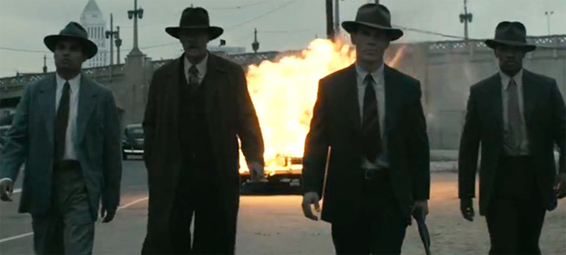Gangster Squad, an Untouchables–Dick Tracy (that is, without either of those movies’ vivacity), finally gets its belated release this Friday. The cast of the new movie is enough to make you take notice; it features Sean Penn, Ryan Gosling, Josh Brolin, and Emma Stone. But it is the story of the film’s delayed release that is undoubtedly more fascinating than the movie itself. Back in July 2012, in the wake of the Aurora, CO theater shootings, skittish producers pushed-back the release of this movie to cut a scene that, awkwardly-enough, featured a shooting in a theater. That places Gangster Squad squarely in the middle of the debate about representations of violence in our entertainment.
That’s said, the quality of the new movie renders the debate about violence and entertainment moot. Unlike some other films that have come out over the past month that depict — and take-up the question of — violence (like Zero Dark Thirty, Django Unchained), Gangster Squad is a guileless movie that, despite its cast, possesses little life and hardly any energy outside of its frenetic and often nonsensical action sequences. These scenes interrupt a slow-drawling plot in an effort to lend the film a little life by smattering the screen with gunfire, explosions, and revving car engines. Questions of entertainment ethics aside, in order for Gangster Squad to work it must win us over with its violence; that it fails not only renders the movie impotent as a glorification of brutality, it makes the film less than entertaining.
Gangster Squad is supposed to make us feel ambiguous about what is happening on screen. The movie tells the story of a vigilante squad of Los Angeles police officers, led by a stone-gazed Josh Brolin as Sgt. John O’Mara, who go off-line, breaking up the operations of the cutthroat head underworld thug, Mickey Cohen (Sean Penn), by employing Cohen’s methods: bloody raids, sabotage, murder. O’Mara is a decorated war vet, and when he moves with his pregnant wife to California, he is quickly singled-out by the police chief after the hot-headed cop busts up one of Cohen prostitution houses.
There are all sorts of dangling plot points. O’Mara’s wife doesn’t want her husband to get in the line of fire, but then she helps pick his crew; the squad never takes much time to plan anything, opting to just bust-in and blow the lid off any lead they get. There’s some clumsy talk about heroics and war, about the restless soldier struggling to reconcile himself with peace time. All of it is undercut by the paper thin characters, which, at times seem to demand to be taken seriously, and at other times seem to want to be pulp-heroes, vivid and blunt. What we get is something in middle, hesitant and lackluster.
Even Gosling and Penn can’t help this film, though they both show flashes of inspiration. Penn’s Cohen is the most dynamic character on screen, and his pruned-faced rages and uncontained cruelty should provide a spark. But Penn’s dynamism is like flint with no steel. Gosling plays the baby face, soft-spoken Sgt. Jerry Wooters in a near falsetto – a dandy cop who is happy enough looking out for his own skin until a shoeshine boy is gunned down in the street. Apparently that’s enough to provoke a complete life change for Wooters, whose newfound sense of moral anguish drives the young cop to join O’Mara’s tough guy crew. It is hardly a convincing motivation, but part and parcel for a film that never manages to give its characters any personality beyond a quick backstory brush strokes: the pregnant wife, the admiring son, the cultural pride, the dame at home.
The question of violence is raised (rather clumsily, which is typical for this overt and inarticulate movie) by one of the film’s characters, Officer Conway Keeler (Giovanni Ribisi), toward the mid-point of the film. Are the good guys as bad as the bad guys if they employ the same means to different ends? It is a moral reflection that fall flat not because it isn’t relevant to the story, but because we aren’t convinced by Gangster Squad’s characters or violence that anything that is happening on screen is of any consequence. The violence, in Gangster Squad, is rather like wall paper glue, messy, drippy white muck slathered around to make something flimsy stick to something hard. It is not an exhalation of blood and bullets, it is resignation to the only idea the filmmakers have for creating onscreen energy.





